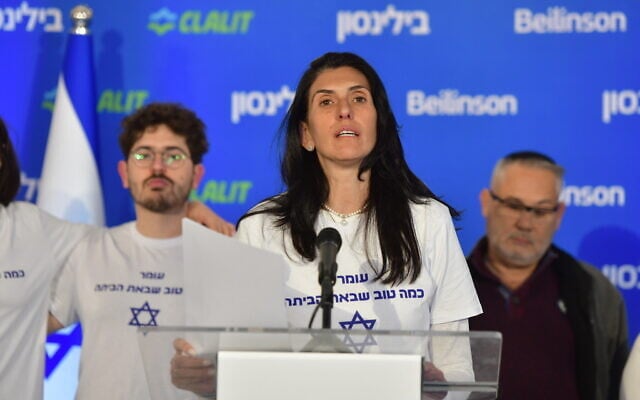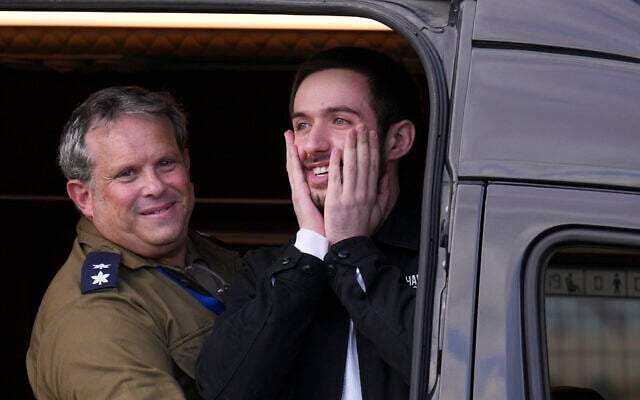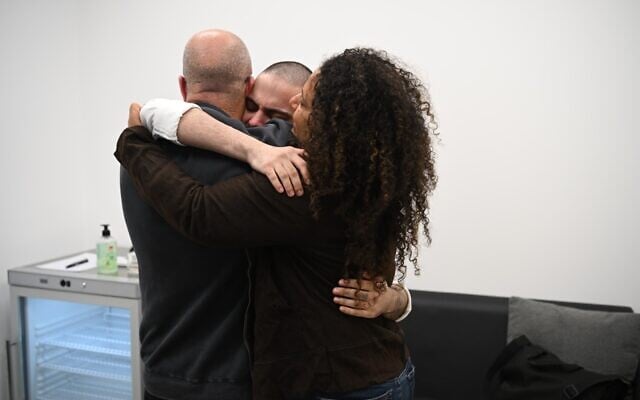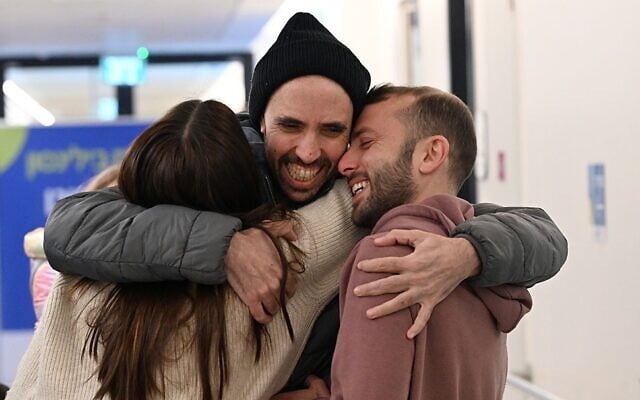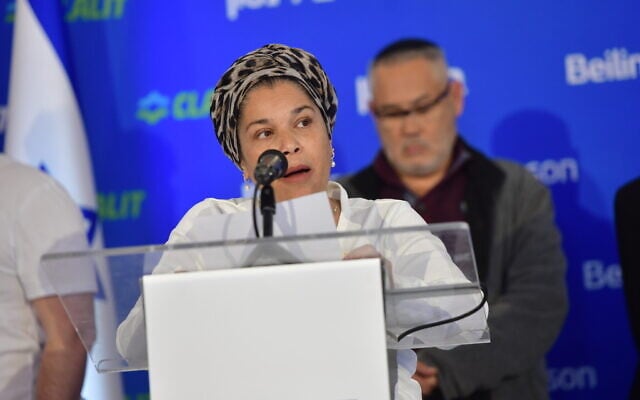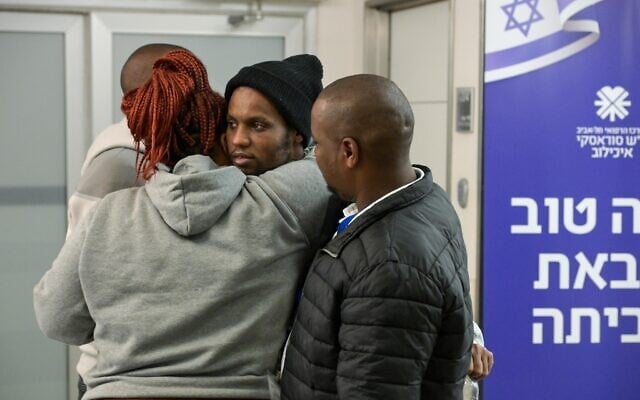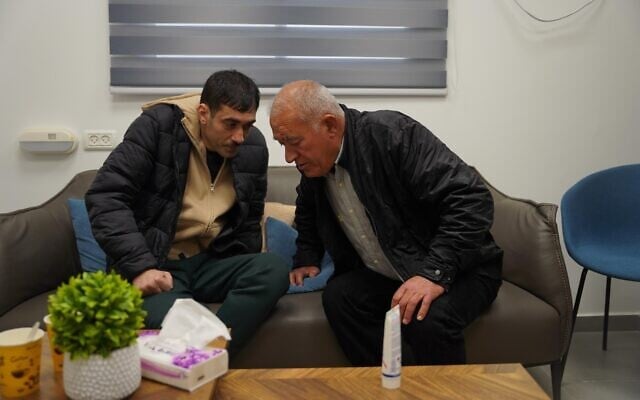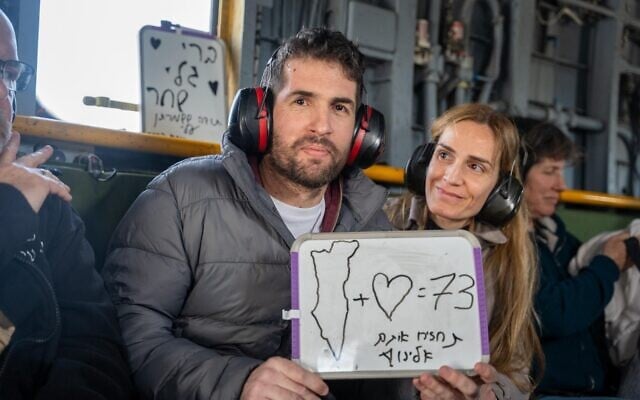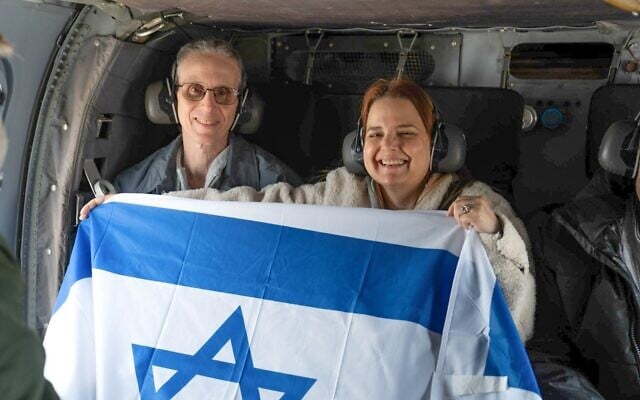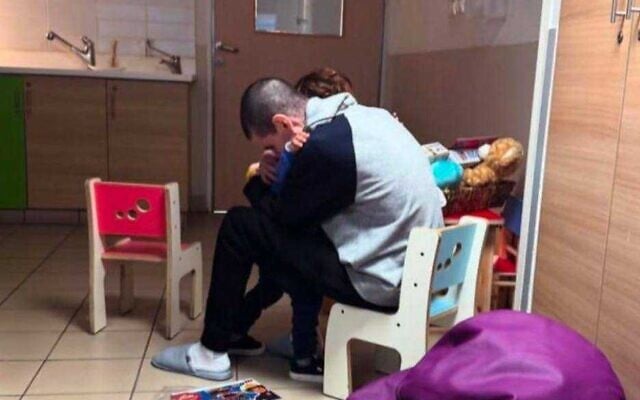


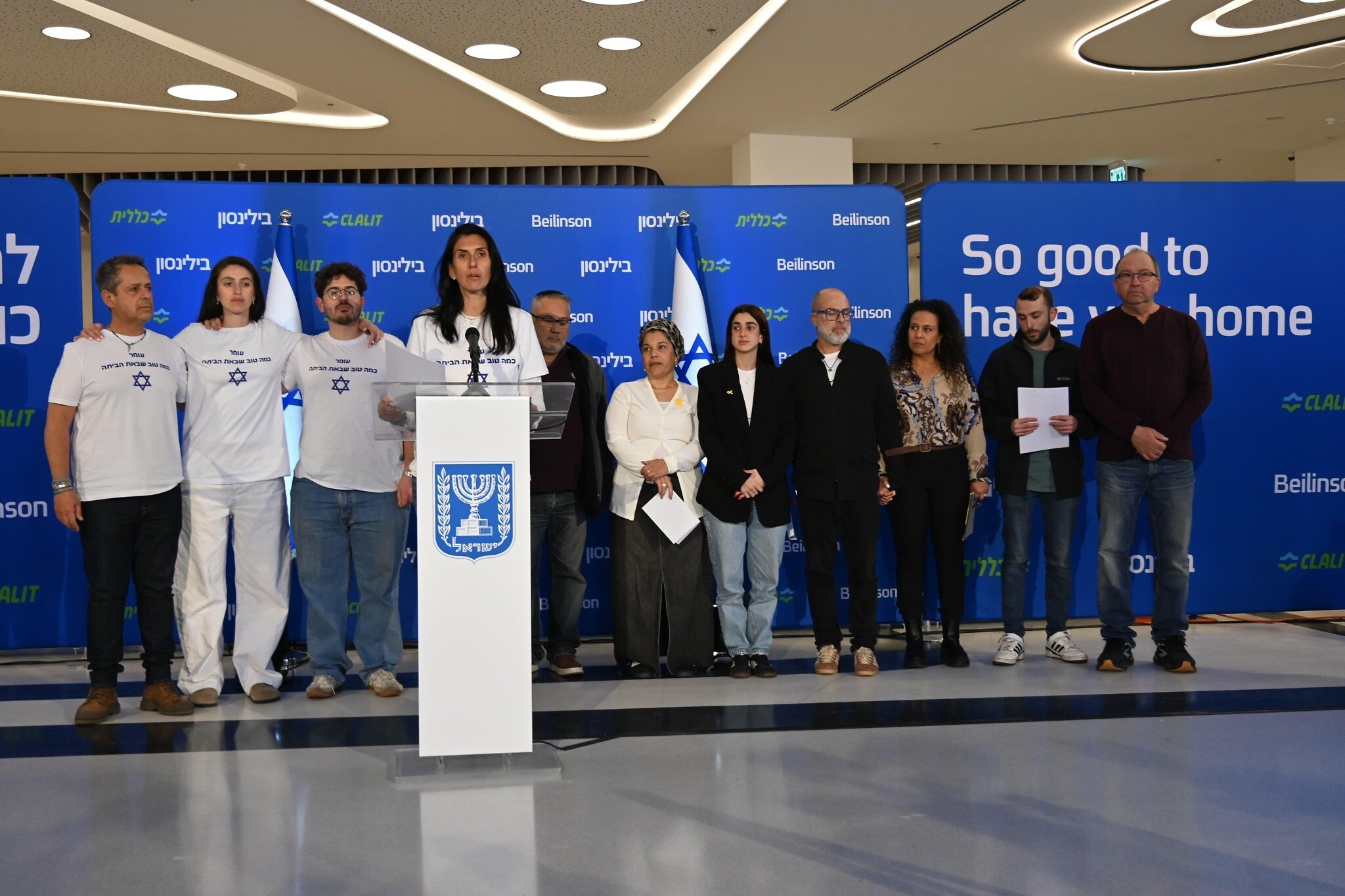
The families of several recently freed hostages demanded during a press conference on Sunday that the Israeli government follow through with the remainder of the ceasefire and hostage deal outline, as they shared a glimpse into the horrors their loved ones had endured during the 500-odd days they were in captivity.
Speaking from Rabin Medical Center, the parents and siblings of Omer Shem Tov, Omer Wenkert, Eliya Cohen, and Tal Shoham recounted some of the details their sons had shared with them, from being held alone in the dark for over 400 days, to not receiving medical treatment for chronic conditions and finding a way to stay connected to their Judaism while in Gaza.
At other hospitals in central Israel, the families of freed captives Avera Mengistu and Hisham al-Sayed looked ahead at the arduous rehabilitation process that now awaits their loved ones, who were returned on Saturday after more than 3,000 days in captivity
Shelly Shem Tov, the mother of Omer Shem Tov, said that her son, who was kidnapped from the Nova music festival, was kept alone in a tunnel for 450 days.
She said that upon his return, he told her that while in captivity he had dreamed of being able to lay his head on his mother’s lap and have her stroke his hair, and going to ride with his father on his motorcycle.
She recounted that Omer said he only finally breathed again when he first met the IDF troops as he was released.
Shelly also took the opportunity to offer gratitude and recognition to murdered hostage Ori Danino, who on October 7, 2023, went back into the unfolding massacre at the Nova music festival, from which he had escaped, to pull out Omer, along with siblings Maya and Itay Regev. All four were then taken hostage, and the Regev siblings were released in November 2023.
Danino was slain in captivity in August 2024, in a tunnel under Rafah in southern Gaza, along with Hersh Goldberg-Polin, Eden Yerushalmi, Alex Lobanov, Carmel Gat and Almog Sarusi.
“He didn’t think about himself or his family, just that you don’t leave anyone behind,” Shelly said of Danino. “He is the hero and the angel who saved them.”
Omer Wenkert, who was snatched from the Nova music festival by invading Hamas terrorists, lost more than 30 kilograms (66 pounds) while in captivity, his mother Niva said, adding that he never received any medical treatment for colitis, a chronic condition he had prior to being taken hostage.
“Omer defeated captivity,” Niva said, but vowed that even now, “our fight continues until the last hostage is home.
Her husband Shai Wenkert thanked the country for the solidarity and reiterated the need to bring all the hostages home. He also thanking US President Donald Trump and US Mideast envoy Steve Witkoff for their efforts to return his son and all the other hostages.
Mor Korngold, the brother of Tal Shoham, said that it was hard for him to find the right words beyond “thank you,” as he thanked Trump, as well as the Austrian government and its ambassadors for its assistance, as Shoham is an Austrian citizen.
“We’re always in the same boat, and always strong,” he said, thanking the country for its support over the past 16 month, and the government for making the necessary decisions that led to his brother’s release, even though it was difficult.
The family’s only request, said Korngold, was for an agreement to be reached that would “bring fathers to their children and children to their parents.”
“We have a window and we can’t lose this opportunity,” he said of the hostage deal, which faces an uncertain future as the first phase is slated to end later this week. Bringing the rest of the hostages home, he said “does not come at the cost of our security — the opposite, it is the basis on which our security lies.”
Echoing Korngold’s call for the remaining hostages to be brought back to Israel, Eliya Cohen’s partner Ziv Aboud said that even though Eliya was now back with her, “there is no victory until everyone is home.”
Aboud, who campaigned for Eliya’s release with a number of prominent acts of protest, said that the past 16 months had been a journey of love.
She also used the opportunity to address hostage Alon Ohel, who was taken captive with Eliya from the same bomb shelter on the outskirts of the Nova festival, and with whom he was held. Ohel, who was wounded in his eye, was not released during the first phase of the ceasefire deal, and his family only discovered that he was alive, after speaking to several recently freed hostages who were held with him.
“Alon Ohel, it’s my promise to Eliya and to your family, that we won’t stop until you’re home,” Aboud said.
She also thanked Aner Shapira, the “hero of the field shelter,” whose actions saved her, as well as Eliya and several others, as he threw back out grenades lobbed inside by Hamas terrorists until he himself was killed.
Eliya’s mother, Siggi, spoke of her son’s religious observance and said that he had prayed every day in captivity, and said the kiddush prayer over water on Friday nights.
Like Aboud, Siggi addressed Ohel, vowing: “You’re not alone and we’ll fight for you until you come home.”
According to a Channel 12 report on Sunday, Cohen spoke to Ohel’s family soon after his return to Israel on Saturday, telling them it was hard for him to leave Ohel behind, as he is now being held on his own.
The report said that Eliya had undergone surgery during captivity to remove bullets, but was not given any anesthesia.
In addition to being held with Ohel, Eliya was also held with Eli Sharabi and Or Levy, who were freed two weeks ahead of him.
The men were chained together by both their hands and their feet, Channel 12 reported, which caused them physical injuries, in addition to those sustained as a result of their captors abusing them.
The report said the men were only unchained in recent weeks, pending their release, and had to “learn to walk again.” Cohen was also given a large amount of food in the time leading up to his release in order to improve his appearance.
Cohen reportedly told his loved ones that he was held in a tunnel that was bombed by the IDF, and managed to escape just in time.
At a different point in his captivity, he also spent some time held with Almog Sarusi, who was murdered in August along with Danino and four other hostages.
Also on Sunday, the families of Hisham al-Sayed and Avera Mengistu gave statements regarding both of their conditions, after the two spent more than 3,000 days in captivity.
Mengistu and al-Sayed entered the Gaza Strip of their own accord in 2014 and 2015, respectively, amid mental distress. Reports following the October 7, 2023, massacre indicated that Hamas had lulled Israel into complacency by feigning serious interest in a deal for Mengistu and al-Sayed.
The families of Mengistu, a member of the Ethiopian Israeli community, and al-Sayed, from the Negev’s Bedouin community, had struggled over the years to rally public support or pressure the government to negotiate their release, with some alleging racism.
Avera’s brother Ilan Mengistu said on Sunday that “finally, finally, the long terrible journey has reached its end.”
“Avera, whose name means life, is home, Avera lives!” he said, speaking at the hospital where his brother was recuperating.
He noted, however, that Avera has a long path ahead of him as he rehabilitates, and said that while the photos of the reunions between released hostages and their families are emotional and joyful, there are many other issues to be dealt with upon their return home.
“We’re here for you and pray for your full recovery,” Ilan said.
Hisham’s father Sha’ban al-Sayed said on Sunday that his son had returned a shell of a person, and was kept in inhuman conditions during his decade in Hamas captivity.
He slammed Hamas for “playing politics on the back of someone who is mentally unwell and said that throughout his son’s captivity, he believed that the terror group would take care of the captives because it was in their interest.
“Then I saw on October 7 how they killed Bedouin, Arab people who weren’t soldiers,” he said. “We want the Arab world to see this and to hear what they say. To know that they killed and took captive Arab people and a woman in Bedouin dress?”
He said that when his son returned yesterday, he was relieved to see him walking on his own, but when he finally hugged him, he was hugging a shell of a person.
Hisham can barely speak, he said, and has no memory.
“It gives us the sense that he wasn’t kept by humans, and we want an answer, we want an answer,” he said.
He thanked everyone in the Israeli government who worked to secure Hisham’s release, as well as Trump, who he said “gave us strong support.”
He ended with a call for the remainder of the hostages to be brought home “without waiting for further stages” of the hostage deal.
Meanwhile, the Prime Minister’s Office said on Sunday that Prime Minister Benjamin Netanyahu had spoken by phone with released hostages Sagui Dekel-Chen and Ohad Ben Ami and their wives.
Dekel-Chen was freed on February 15, and Ben Ami was freed a week earlier.
According to Netanyahu’s office, he asked about their return to their homes and families, and emphasized “the victory of their bodies and spirits during their captivity.”
Netanyahu told the two that Israel had to apply great pressure on Hamas to secure their release.
“Hamas demanded the release of only a limited number of live hostages in the current agreement, while the prime minister insisted on maximizing the number of live hostages who return in phase one of the deal,” said the self-congratulatory PMO statement, “and this effort succeeded thanks to our brave soldiers and determined and informed decision-making.”
Netanyahu promised that he will continue working to bring all of the remaining hostages home.
Michael Levy, whose brother Or Levy was held along with Cohen and was released on February 8, also said that his brother has met with the parents of Aner Shapira since he returned home, as well as the parents of Alon Ohel.
“Aner’s parents heard about the last moments of their son’s life, they heard it from Or’s perspective,” said Michael.
He said his brother was briefly kept captive with slain hostage Goldberg-Polin at the beginning of their captivity, until Goldberg-Polin was taken for medical care. They met again for a day or two sometime in November 2023, and Or had been sure Goldberg-Polin had since been freed, leading to shock when Or discovered his fate upon his release.
Or also suspected throughout his 15 months of captivity that his Eynav was killed in the roadside bomb shelter from which he was taken, but only when he was released did he find out that she had been murdered that day.
“He has two main things he thinks about,” said Michael. “To continue the struggle for the friends he left behind, and to return to some kind of normal life, somehow, to live in his own apartment, to work and to be a dad to Mogi,” Levy’s 3-year-old son.
Levy says it was very difficult to witness his brother’s skeletal condition when he was released. Or has said that their Hamas captors began giving them more food two weeks before they were released, so that they would not look quite as gaunt.
They “were kept in conditions that animals wouldn’t be kept in,” said Levy.
Or has a long rehabilitation ahead of him, said Michael, “but there’s nothing like running after a 3-year-old to keep you in shape.”
The Levy family is taking small steps toward normalcy, he added, including finally eating Shabbat dinner together, something they did not do during the entire 15 months that Or was a hostage.
“It’s just small, meaningful things,” said Levy. “There’s all these things I wanted to ask him and talk to him about. And now I can finally call him, and ask him stupid questions, like about basketball. I can finally do that. People used to ask me questions for him. Now I say, ‘I have to check with Or, I’m not going to decide for him.”
Seeing the hostages released home is amazing, said Michael, as they switch from two-dimensional posters to real, breathing people.
“We’re still in the struggle to bring them all home,” he said. “We’re just holding different pictures now.”
Terror groups in the Gaza Strip are holding 63 hostages, including 62 of the 251 abducted by Hamas-led terrorists on October 7, 2023. They include the bodies of at least 36 confirmed dead by the IDF.
Hamas has so far released 30 hostages — 20 Israeli civilians, five soldiers, and five Thai nationals — and the bodies of four slain Israeli captives — Shiri, Ariel and Kfir Bibas, and Oded Lifshitz — during a ceasefire that began in January. The terror group freed 105 civilians during a weeklong truce in late November 2023, and four hostages were released before that in the early weeks of the war.
Eight hostages have been rescued from captivity by troops alive, and the bodies of 41 have also been recovered, including three mistakenly killed by the Israeli military as they tried to escape their captors, and the body of a soldier who was killed in 2014.
The body of another soldier killed in 2014, Lt. Hadar Goldin, is still being held by Hamas, and is counted among the 63 hostages.
Lazar Berman contributed to this report.

